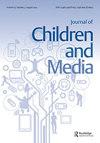What do parents really know about their child’s online behaviour? Discrepancies between parents and their children in Israel
IF 2.1
3区 心理学
Q2 COMMUNICATION
引用次数: 3
Abstract
ABSTRACT This study examined the discrepancies between the perceptions of fathers, mothers and children’s perceptions regarding internet use mediation strategies (enabling and restrictive) and their relations with child disclosure. Fifty families participated in the study (father, mother, and child). It was found that there were discrepancies between children’s perception of their parents’ restrictive and enabling mediation strategies, and their parents’ reporting of those mediation strategies. Child disclosure of his/her browsing experiences with the mother was positively related with her use of both restrictive and enabling mediation strategies, but not with the father’s use of these strategies, nor for mother–father discrepancies. This study makes an important contribution by measuring all three members of the triad and explores the family unit and its implication on children’s disclosure. IMPACT SUMMARY Prior State of Knowledge: Most of the research on mediation strategies has focused on mothers’ behaviours, with most data gathered either by child or mother reports. This ignores the role of the father. Novel Contributions: We relied on both parents and their child to report on mediation strategies, the discrepancies between the parents and examine how those discrepancies explain the extent to which their child discloses his/her browsing experiences. Practical Implications: The ability to disclose difficulties may be a primary resource for the ability to benefit from social support at times of need. It is of great importance for the children to share their experiences with their parents.父母对孩子的上网行为到底了解多少?以色列父母与子女之间的差异
摘要本研究考察了父亲、母亲和儿童对互联网使用调解策略(允许和限制)的认知差异及其与儿童信息披露的关系。50个家庭参与了这项研究(父亲、母亲和孩子)。研究发现,儿童对父母的限制性和支持性调解策略的认知与父母对这些调解策略的报告存在差异。儿童披露他/她与母亲的浏览经历与她使用限制性和支持性调解策略呈正相关,但与父亲使用这些策略无关,也与母亲-父亲差异无关。本研究的重要贡献在于测量了三要素的所有成员,并探讨了家庭单位及其对儿童披露的影响。影响总结先前的知识状况:大多数关于调解策略的研究都集中在母亲的行为上,大多数数据都是通过儿童或母亲报告收集的。这忽略了父亲的角色。新颖的贡献:我们依靠父母和他们的孩子来报告调解策略,父母之间的差异,并研究这些差异如何解释他们的孩子透露他/她的浏览经历的程度。实际意义:披露困难的能力可能是在需要时从社会支持中获益的能力的主要来源。孩子们与父母分享他们的经历是非常重要的。
本文章由计算机程序翻译,如有差异,请以英文原文为准。
求助全文
约1分钟内获得全文
求助全文

 求助内容:
求助内容: 应助结果提醒方式:
应助结果提醒方式:


